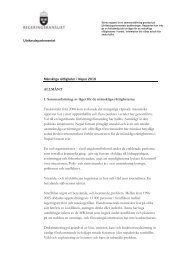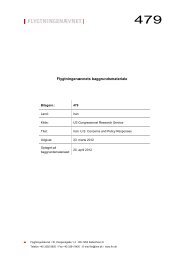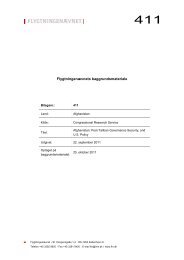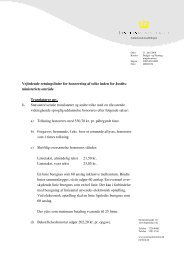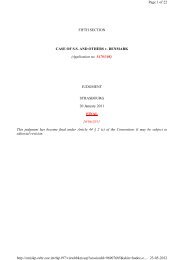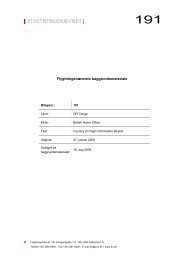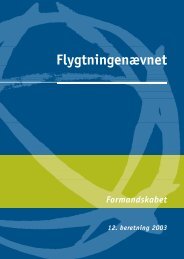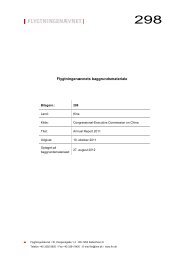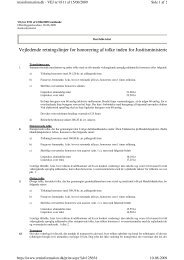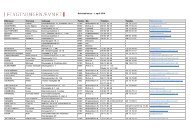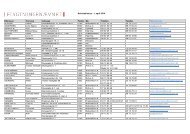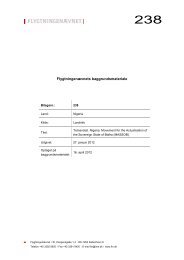Annual Report - National Human Rights Commission
Annual Report - National Human Rights Commission
Annual Report - National Human Rights Commission
You also want an ePaper? Increase the reach of your titles
YUMPU automatically turns print PDFs into web optimized ePapers that Google loves.
Annexure 10<br />
○ ○ ○ ○ ○ ○ ○ ○ ○ ○ ○ ○ ○ ○ ○ ○ ○ ○ ○ ○ ○ ○ ○ ○ ○ ○ ○ ○ ○ ○ ○ ○ ○ ○ ○ ○ ○ ○ ○ ○ ○ ○ ○ ○ ○ ○ ○ ○ ○ ○ ○ ○ ○ ○ ○ ○ ○ ○ ○ ○ ○ ○<br />
○<br />
Phase II: Rescue<br />
Problem: Unplanned raids/rescue operations often result in logistic problems at the ground<br />
level with regard to accommodation, recovery of personal belongings or money, rescue of<br />
children, food, health problems, vocational training, repatriation, etc. defeating the entire objective<br />
of rehabilitation.<br />
Recommendations: The police should plan rescue operations in coordination with the institutional<br />
authorities, in a humanistic and rehabilitation-oriented approach<br />
with the rescued women and children. The proposed Inter-Departmental Coordination structure<br />
suggested in Point No.3 under the head ‘Prevention’ should be used for this purpose.<br />
Problem: Adult women in prostitution are often treated as offenders (arrested and fined/<br />
imprisoned) by the police and the judiciary and not as victims. Also, women trafficked from<br />
across the borders/foreign countries are booked by the police under the Passports Act and the<br />
Foreigners Act and then prosecuted as illegal immigrants.<br />
Recommendations: The policy of the State of penalizing the adult woman in prostitution (e.g.<br />
Section 110 of Bombay Police Act, or Section 145(b) of Indian Railway Act, Section 294 of<br />
IPC) should be stopped. A procedure may be set up whereby victims of cross-border and transnational<br />
trafficking are given assistance, with the help of the Ministry of Foreign Affairs and the<br />
Embassy concerned, to repatriate them in a humane and prompt manner. All women in prostitution<br />
should be presumed to be victims in need of assistance to get out of prostitution, as is the case<br />
with minors.<br />
Problem: Rescue operations and raids on premises where organized prostitution is carried on, is<br />
carried out in an ad-hoc manner and not as a part of mainstream policing. Quite often, the<br />
priority given to this work depends on the personal interest of the officer on the job. The focus of<br />
raids with the objective of rescuing girls and women from prostitution primarily happens in big<br />
cities and that too is limited to red-light areas. Rehabilitative and anti-trafficking sections of the<br />
law and acts thus do not get properly implemented. For example, in small towns and semi-urban<br />
areas, the focus of raids continues to be penalizing the women under sections, such as, 110 of<br />
BP Act and hardly anyone is seen as in need of rescue and rehabilitation. Also, when raids are<br />
conducted in lodges, massage parlours, etc., they are termed as ‘busting of rackets’ and the<br />
women found in these premises are arrested for soliciting or indecent exposure.<br />
Recommendations: A specialized anti-trafficking structure within the police at the Central,<br />
State, district and taluka levels should be established in order to deal with the issue of trafficking<br />
(including cross-border and inter-State), rescue, recovery of personal belongings, repatriation,<br />
etc., along the lines of structures set up within the police to deal with trafficking of drugs, smuggling<br />
of antiques, wild life poaching, etc.<br />
262<br />
<strong>National</strong> <strong>Human</strong> <strong>Rights</strong> <strong>Commission</strong> <strong>Annual</strong> <strong>Report</strong> - 2004-2005<br />
AR-Chapter-1-19-10-6-06.p65<br />
282<br />
7/17/06, 6:31 PM



